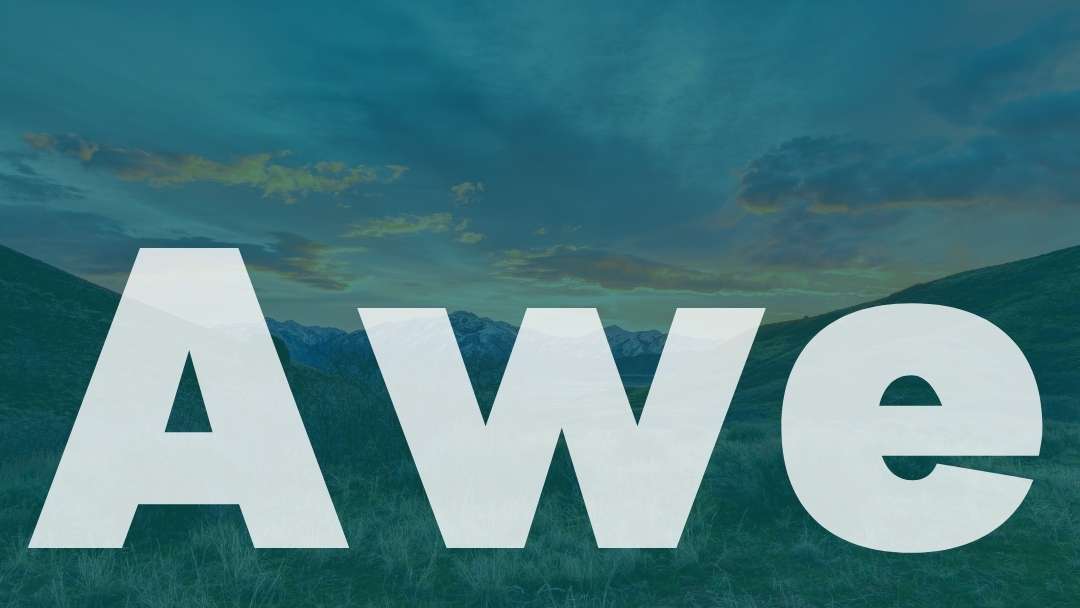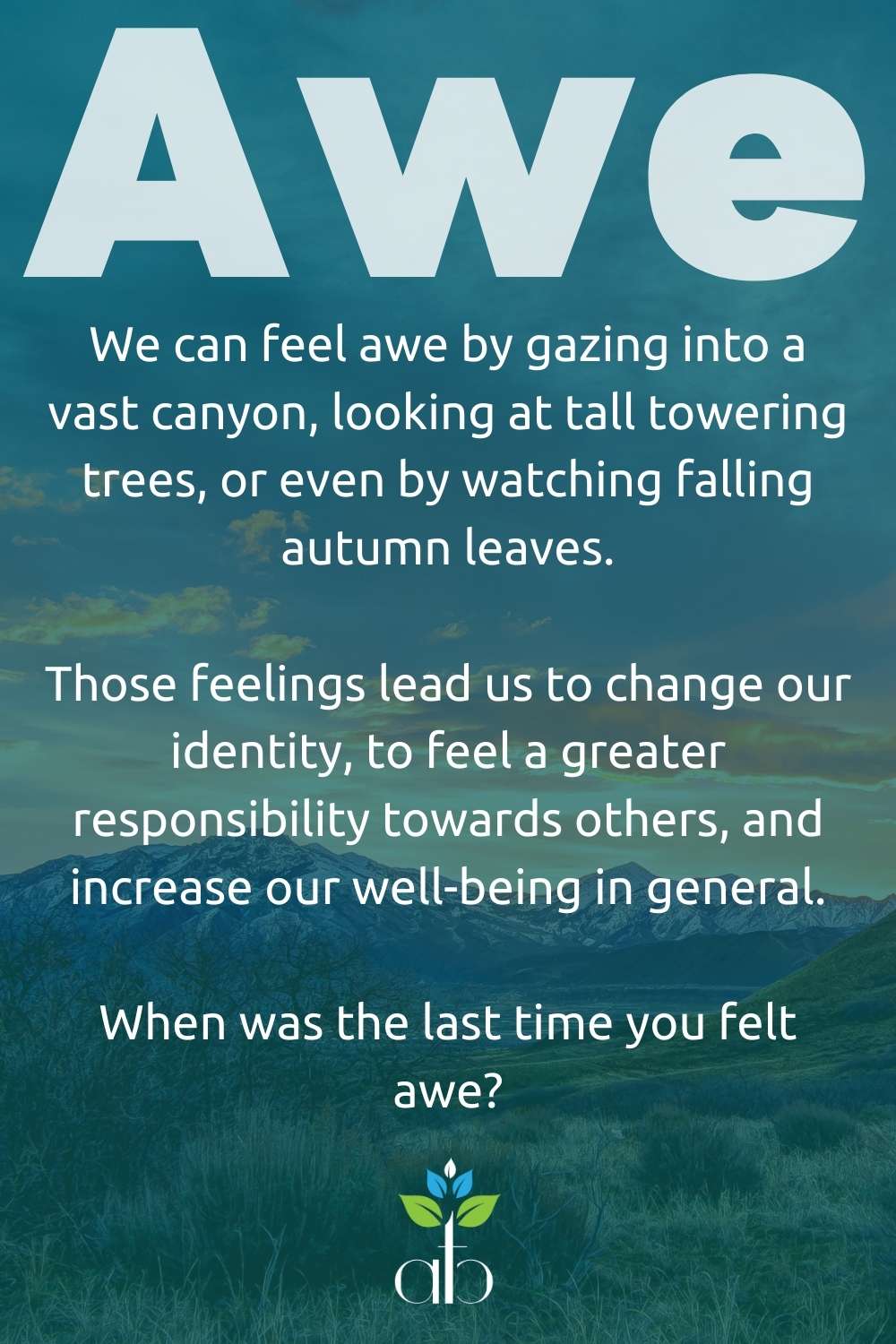Episode 324
In Awe

Awe is an extremely powerful emotion, and we can feel its power in the very experience – standing before a vast canyon, watching golden autumn leaves tumble to the ground, or even seeing someone stand up to injustice.
As it turns out, this feeling doesn’t just affect us in the moment, but also has lasting effects.
In studies at Berkeley lab, scientists discovered that when people felt awe, for example, by standing in front of the replica of a T-Rex skeleton, or by gazing at the tallest eucalypts in North America, their identity would be affected – identifying more with something greater than themselves, with societal responsibility for example.
They would also be more willing to help a stranger in need after feeling awe, and more likely to feel greater well-being in the weeks afterwards.
Awe is awesome.
Hosts & Guests
Kurt Robinson
Transcript
I was thinking about some interesting things that I read in Michael Polland’s book How to Change Your Mind. In that book he refers to some studies from Berkley university, especially from Dacher Keltner.
It’s interesting Dacher Keltner doing research at a university turns out he’s a Fellow tapatío which means he was born in Jalisco.
I found this interesting article on the Berkley website from Dr Keltner and he’s talking about some of his research about awe. About having that experience of impressiveness, when we are impressed by looking across a canyon or staring at grand trees. Even more mundane things perhaps we don’t get out in nature every day to look across a gully but we might see a single leaf fall from a tree in autumn picked up by the wind.
Some small thing which inspires that awe within us. I talk about these things a lot and as it turns out there are perhaps more valuable, even deeper in the physical realm than I might have assumed.
Of course these experiences are valuable of themselves. It turns out they also have positive effects.
Keltner mentions in the article about how an excess of cytokines can have problems relating to our health because it causes inflammation.
So when cells are damaged cytokines get sent out like a certain kind of chemical. Like a signaling chemical, but of course when there’s an excess of course it means there will be inflammation. That can lead to greater health problems.
When we experience awe it tends to bring this system into balance so people have less cytokines going through their body. There’s other examples too.
“For example, in one study from our Berkeley lab, my colleague Michelle Shiota had participants fill in the blank of the following phrase: “ I AM ____.” They did so 20 times, either while standing before an awe-inspiring replica of a T. rex skeleton in UC Berkeley’s Museum of Paleontology or in the exact same place but oriented to look down a hallway, away from the T. rex. Those looking at the dinosaur were more likely to define their individual selves in collectivist terms—as a member of a culture, a species, a university, a moral cause. Awe embeds the individual self in a social identity.”
Some of my listeners, out there, my individualist anarchist friends will object to that term collectivist. The point is we can acknowledge we are part of a society, part of a culture that even as a individual we are part of something greater which is very interesting. Having a sense of awe affects our sense of identity.
Another example here, to give some context, he’s talking about that in that same museum there is a grove of Eucalyptus trees, the tallest in North America. And of course gazing at these extremely tall trees will bring you into that state if you allow it.
“Participants first either looked up into the tall trees for one minute—long enough for them to report being filled with awe—or oriented 90 degrees away to look up at the facade of a large science building. They then encountered a person who stumbled, dropping a handful of pens into the dirt. Sure enough, the participants who had been gazing up at the awe-inspiring trees picked up more pens. Experiencing awe seemed to make them more inclined to help someone in need. They also reported feeling less entitled and self-important than the other study participants did.”
It affects our identity and also affects our actions.
“One last study from our Berkeley lab speaks to the promise of daily awe. Amie Gordon gathered people’s daily reports of awe for two weeks and found that it is surprisingly common in everyday living. Every third day, on average, people feel that they are in the presence of something vast that they do not immediately comprehend. For example, seeing gold and red autumn leaves pirouette to the ground in a light wind; being moved by someone who stands up to injustice; and hearing music on a street corner at 2 AM all elicited such a feeling. Intriguingly, each burst of daily awe predicted greater well-being and curiosity weeks later.”
So, yes it affects these things. Identity, actions of course it effects our emotions in the moment. Also two weeks later. Also affects our curiosity. I recommend this article it talks also about problem solving creativity and persistence.
All of these things happen because we pause to wonder to enjoy something that is a little baffling to us, to get lost in that feeling.

New Episodes Every Weekday
11am Mexico City time
10 min episodes Monday - Thursday
1 h interview episode on Fridays
As an Amazon Associate I earn from qualifying purchases.
Stay Beautiful &
Stay Connected
